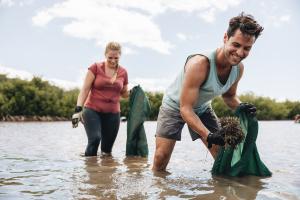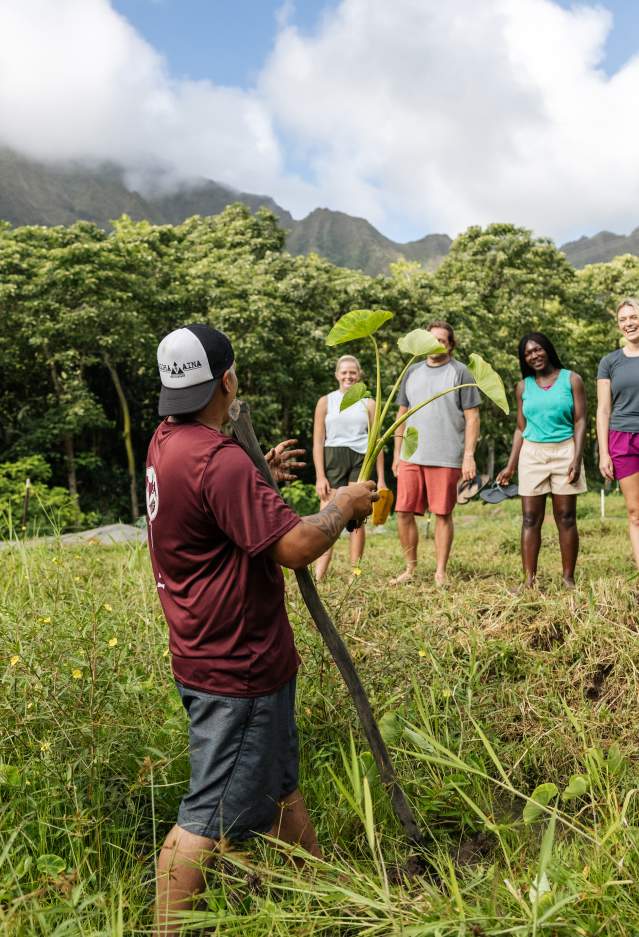Corporate Social Responsibility - Mālama Hawaiʻi

Welcome back to Hawaiʻi, where your return isn't just a revisit—it's an opportunity to make a meaningful impact. Through Mālama Hawaiʻi, our corporate social responsibility (CSR) program, we invite groups like yours to play a vital role in caring for Hawaiʻi's essence—its land, people, and culture. Mālama, which embodies the idea of 'taking care,' serves as a pathway to forge profound connections via impactful volunteer initiatives.
Explore a range of volunteer opportunities with community organizations across the islands that not only benefits Hawaiʻi but also offers exclusive activities for your group.
For further details or to discuss scheduling a volunteer project, kindly reach out to Kylee Dean-Kobatake from our Client Services Department at kdean-kobatake@hvcb.org. Individual attendees and families are also encouraged to contribute at a personal level with ideas available on our voluntourism page.
Statewide Opportunities
Hawaiʻi Land Trust
Hawaiʻi Land Trust (HLT)’s mission is to protect lands that are integral to Hawaiʻi’s well-being and character, upholding our kuleana (responsibility) to these lands and the communities they are in. Volunteers help with restoration and conservation projects, including land stewardship, all across Oʻahu, Kauaʻi, and Maui.
Hawaiian Legacy Reforestation Initiative
The Hawaiian Legacy Reforestation Initiative aims to restore native forests, nurturing them into diverse Hawaiian ecosystems. Attendees can support this mission from home by sponsoring a Legacy Tree. Sponsors receive an electronic certificate with the tree's ID and GPS location, allowing them to track its growth. On O‘ahu, attendees can plant and dedicate their sponsored tree at Gunstock Ranch during a unique Planter's Experience on horseback or ATV.
Oʻahu
Battleship Missouri Memorial (Central Oʻahu)
Groups can volunteer aboard the historic, decommissioned USS Missouri and get a unique chance to explore areas not accessible to the public, involving tasks like cleaning, sanding, touch-up painting, and contributing to the preservation of the ship's decks. The minimum number of attendees required for participation is five, with a maximum capacity of 25 individuals.
Hawaiʻi Convention Center Carbon Offset Program
In collaboration with Legacy Carbon, the Hawai‘i Convention Center enables event groups to offset their environmental impact by supporting reforestation through the One Million Trees program. This initiative, in partnership with the Hawaiian Legacy Reforestation Initiative (HLRI), is certified by the Gold Standard Foundation in Switzerland, making it the first forestry project in North America to issue Gold Standard credits.
Loko Iʻa Pāʻaiau (Central Oʻahu)
A National Historic Site, Loko Iʻa Pāʻaiau safeguards one of the area's few ancient fishponds which once served as the home of Kalanimanuia, Oʻahu's ruler 500 years ago. Volunteers aid in its revival by removing invasive mangroves and relocating stones. Up to 60 volunteers can be accommodated with a two-month advance notice.
Mālama Maunalua (East Oʻahu)
Mālama Maunalua is dedicated to revitalizing Maunalua Bay's ecological well-being, primarily achieved through its Huki Program which focuses on the removal of invasive algae from the nearshore waters. Participation requires a minimum of 10 attendees and a two-month advance notice is kindly requested for coordination.
Sustainable Coastlines Hawaiʻi (Island-wide)
Through collaboration with Sustainable Coastlines Hawaiʻi, groups engage in debris and microplastic removal activities while documenting their achievements on data sheets, gaining valuable insights into the impact of their actions. Moreover, they can opt for DIY cleanup kits to organize their mini-cleanups, fostering hands-on learning experiences.
Waimea Valley (North Shore)
Waimea Valley’s volunteer opportunities aim to foster deeper connections to the precious ʻāina (land) and traditional Hawaiian cultural practices. The program invites groups to participate in an enriching service learning experience, offering exclusive workdays on flexible schedules. The program requires five attendees and a maximum capacity of 60 (up to 125 with advanced notice and group splitting). A two-week advance notice is encouraged.
Wild Side Specialty Tours (West Oʻahu)
Wild Side promotes regenerative travel, where guests actively participate in caring for the sea through hands-on experiences and citizen science initiatives. These opportunities aim to protect the ocean's beauty, promote sustainability, and gather research aiding scientists and local communities in reaching vital conclusions.
Kauaʻi
The Friends of Kamalani and Lydgate Park (Līhuʻe)
The Friends of Kamalani and Lydgate Park organizes regular Saturday beach cleanups at Lydgate Beach Park, running from 8:30 am to 10:30 am. These sessions focus on tidying the Morgan's Ponds beach enclosure by removing marine debris and driftwood. Exclusive events accommodate a minimum of 25 attendees and can host up to 100 participants.
Surfrider Foundation Kauaʻi (Island-wide)
Surfrider Kauaʻi is committed to safeguarding and cherishing the world's oceans, waves, and beaches through their focus on Conservation, Activism, Research, and Education (CARE). Volunteers have the chance to join a Surfrider team leader in removing harmful plastics and marine debris that endanger ocean life like whales, seals, and turtles. Exclusive events require a minimum of 8 attendees and can accommodate up to 50.
Hawaiʻi Island
ʻĀina Hoʻōla Initiative (Hilo)
Groups can assist in reviving the wetland habitat for endangered or threatened waterbirds at Lokowaka, Kiʻonakapahu, and Akahi fishponds in Hilo, Hawaiʻi. Community workdays occur weekly and entail the removal of invasive non-native plants, replaced by native species to restore the area. Exclusive events have no minimum attendee requirement and can host up to 20 individuals, with staff fluent in Japanese besides English.
Friends of Amy B. H. Greenwell Ethnobotanical Garden (West Hawaiʻi Island)
The Amy B.H. Greenwell Ethnobotanical Garden focuses on conserving native plant resources, traditional land use, and cultural practices within its 15-acre premises, showcasing over 200 “pre-Cook” plant species. Saturday mornings often involve weeding activities, but alternative scheduling can be arranged based on staff availability. The Garden operates from Thursday to Saturday, 9 am to 2 pm, without a minimum attendee requirement for exclusive events, accommodating up to 12 individuals.
Hawaiʻi Environmental Restoration (East Hawaiʻi Island)
Hawaiʻi Environmental Restoration (HER) aims to restore Hawaiʻi's environment and educate communities about vegetation issues and solutions. Volunteer tasks mostly involve hand-pulling invasive plant species threatening the rainforest's integrity and caring for native species to support its resilience. Workdays are on Mondays, 9:30 am to 4 pm for groups of five or fewer, while larger groups can be accommodated on most weekdays.
Uluhaʻo o Hualālai (West Hawaiʻi Island)
Uluhaʻo o Hualālai’s mission is to engage families in the stewardship of Hualālai’s natural and cultural resources for generations to come. Work days and special cultural workshops aim to bring the community together while enhancing the native forest ecosystems by removing aggressive invasive species, while propagating and out-planting select native species.
Waikōloa Dry Forest Initiative (West Hawaiʻi Island)
Waikōloa Dry Forest Initiative is a community-driven non-profit that cares for the dryland forest of Waikoloa. Volunteers help to restore this special ecosystem through native planting, seed collection, and weed management. Workdays can be scheduled Monday through Saturday, 8am – noon for up to 30 attendees.
Maui
Keālia Pond National Wildlife Refuge (Kihei)
An important wetland for endangered Hawaiian stilts and coots, Keālia Pond National Wildlife Refuge is the site of one of the largest dry forest restoration projects on Maui. Volunteer work is almost always native planting, though sometimes invasive species need to be removed.
Kipuka Olowalu (West Maui)
Kipuka Olowalu is a 72-acre cultural reserve that stretches mauka (mountain side) to makai (ocean side). Volunteers partake in restoration work in areas of the property including general cleaning, invasive species removal, and native plantings followed by an educational session. Regular volunteer days for individuals and small groups take place Wednesdays and Thursdays 7:30 am — 11:30 am. Larger groups (10–50 people) can be accommodated on different days.
Leilani Farm Sanctuary (Haʻikū)
Leilani Farm Sanctuary provides care for rescued animals and humane education to the community. Workdays typically take place Mondays and Wednesdays at 9am and include tasks like gardening, animal grooming, trail maintenance and cleaning the barn.
Mālama KAʻEHU (Wailuku)
KAʻEHU aims to restore the land and perpetuate traditional Hawaiian culture using a community-based, inclusive, family-oriented approach to environmental stewardship and sustainable agriculture including beach cleanups. As little as 10 volunteers can participate and up to 25.
Maui Cultural Lands (West Maui)
Groups can help protect Honokowai Valley, one of Maui’s richest archaeological sites, and learn about how ancient Hawaiians thrived in this place. Regular volunteer days for individuals and small groups take place Saturdays at 9am. Groups larger than 10 people can be accommodated on different days.
Pacific Whale Foundation (Island-wide)
The Coastal Marine Debris Monitoring Program is a beach cleanup program that provides visitors and residents the opportunity to get involved in taking care of the local environment. Individuals can pick up a beach cleanup kit from one of their kit stand partners and clean up any beach they choose, disposing of the trash properly and returning the provided data sheet to PWF. For large groups, PWF can lead the cleanup at your beach of choice, provide a short talk about marine debris, if desired, and provide bags and reusable gloves to participants.
Molokaʻi
Molokaʻi Land Trust (Leeward)
The mission of the Molokaʻi Land Trust is to protect and restore the land, natural, and cultural resources of Molokaʻi, and to promote, educate, and perpetuate the unique Native Hawaiian traditions and character of the island for the benefit of the future generations, particularly Native Hawaiians. Common activities include invasive species removal, out planting of common and rare native species, seed collecting, nursery work/plant propagation, fence repairs/maintenance, etc.
